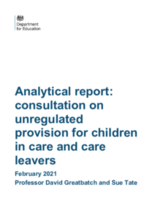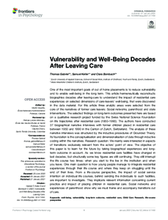Displaying 151 - 160 of 949
This study assesses whether youth in foster care in the United States who are over age 18 have better financial capability and related supports compared with younger youth and whether there are associations between supports and financial capability.
This video tells the story of Kaloyan and Maria, twins who spent the first five months of their lives in an orphanage because social prejudice and poor health meant their parents could not care for them alone.
This study examined racial/ethnic disparities in reunification rates across U.S. child welfare systems controlling for child- and system-factors.
The Department launched a consultation on the use of independent and semi-independent children's care settings that are not required to register with Ofsted (unregulated provision) as a matter of urgency, ahead of the Government’s anticipated wider care review. This report presents the key findings from an independent analysis of responses to the consultation.
This article offers a critical cultural reading of narratives on family reunification in Haiti in social media and advocacy discourse, revealing how this approach privileges Northern assumptions about proper parenting and family life.
In this video on the Do’s and Don’ts of Care Leaver Engagement, Ruth Wacuka discusses what makes engagement meaningful for Care Leavers and what makes it tokenistic, and in the worst cases, exploitative.
This webinar event launched the report 'The digital divide: The impact on the rights of care leavers in Scotland,' which shares the findings of a focused piece of research that sought to understand care leavers' experiences of digital exclusion before and during the COVID-19 restrictions in Scotland in 2020.
This article hermeneutically reconstructs biographies decades after leaving-care to understand the impact of residential care experiences on selected dimensions of care-leavers’ well-being, that were discovered in the data material.
In this study, Interpretative Phenomenological Analysis was used to analyse eight semi-structured interviews with black and minority ethnic (BAME) care-leavers about their experience of identity development.
Through the lens of the ecological systems model, the researchers sought to understand the internal and external factors that former foster youth believe have contributed to or impeded their choices to attend and ability to navigate college.





